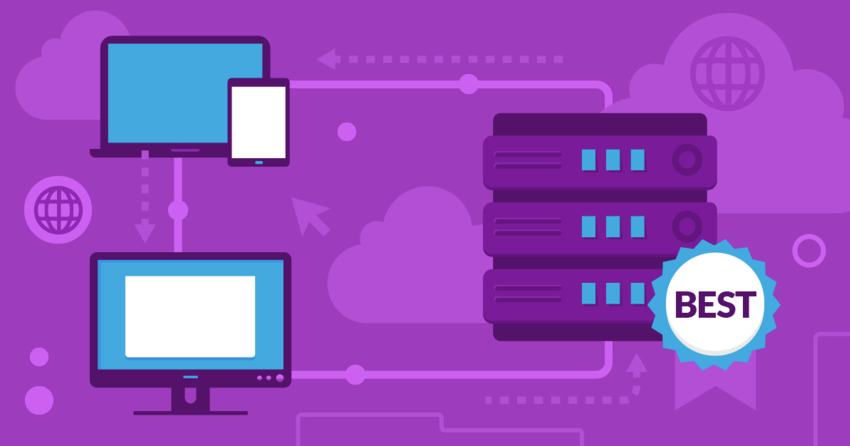Inside this Article
1. Plans and Pricing
Both Hosts Are Affordable, but FatCow Ends Up Costing More Both companies have discounted offers for long-term shared hosting plans, but you get better value for your money with GoDaddy. For example, although GoDaddy’s Deluxe shared plan features the same resources at a slightly higher price than the Original FatCow plan, GoDaddy offers better discounts for long-term contracts. You can save up to 25% with GoDaddy if you’re willing to sign up for a three-year plan. GoDaddy Hosting Web Hosting
Plan NameStorageBandwidthFree SSLNumber of SitesPrice
More detailsA free domain name is included with some hosting plans from GoDaddy Hosting
FatCow Web Hosting
Plan NameStorageBandwidthNumber of SitesPrice
More detailsA free domain name is included with some hosting plans from FatCow
GoDaddy Hosting VPS Hosting
Plan NameStorageCPURAMPrice
More detailsA free domain name is included with some hosting plans from GoDaddy Hosting
FatCow VPS Hosting
Plan NameStorageCPURAMPrice
More detailsA free domain name is included with some hosting plans from FatCow
Hostinger Web Hosting
Plan NameStorageBandwidthFree SSLNumber of SitesPriceFree Months
More detailsA free domain name is included with some hosting plans from Hostinger
2. Support
FatCow’s Support Is Helpful, while GoDaddy Falls Behind Both web hosts offer 24/7 live chat and phone support, with no ticket or email support. To assess whether GoDaddy or FatCow is better in terms of support, I went through a live chat interaction with both. Even though FatCow is part of the EIG conglomerate, a company known for poor, outsourced support, the agents were actually more helpful than GoDaddy’s. Given all the hype around GoDaddy’s services, I was expecting a better customer experience. What I got was a bit different. Right from the get-go, the support agent recommended a website builder plan, which was more expensive than the basic shared hosting plan I needed.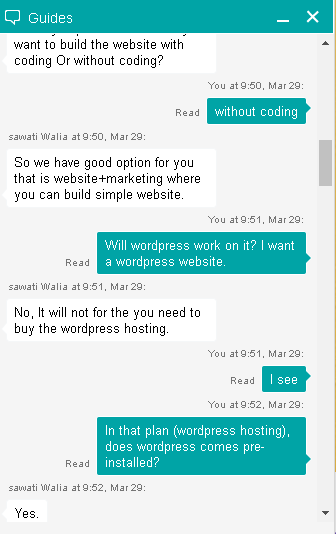
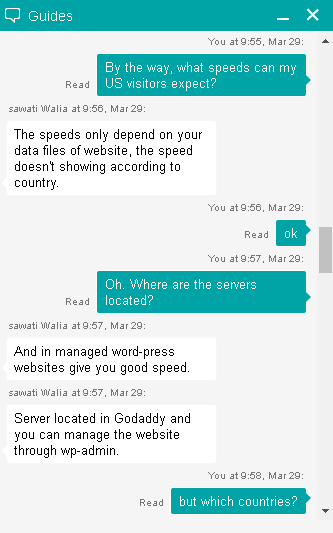

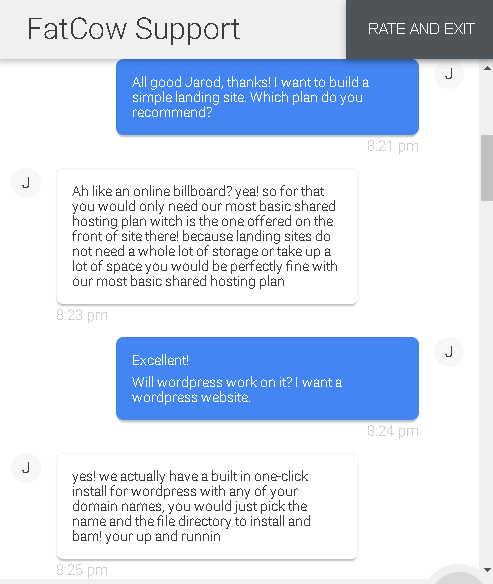
FatCow’s support agent recommends a basic plan
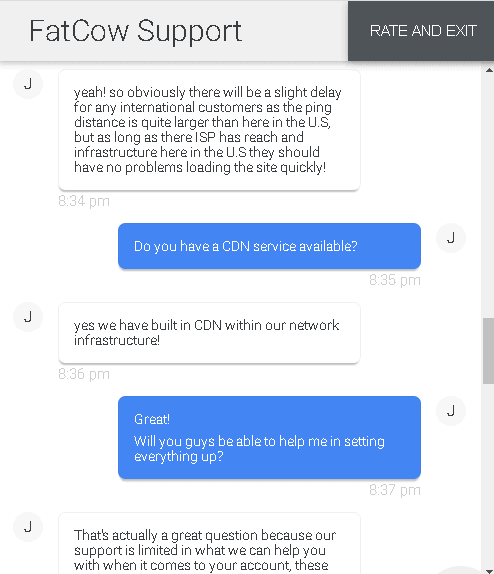
FatCow’s support agent offers CDN information
3. Features
FatCow Is Good, but GoDaddy Is Better GoDaddy has an advantage over FatCow when it comes to features. This is less obvious for shared hosting, where the two are evenly matched, but clearly the case with managed WordPress hosting and VPS plans. For shared hosting, GoDaddy’s Deluxe competes with the Original FatCow plan. Both offer unlimited storage, bandwidth, and websites. You might think that FatCow’s free website builder is a sweet freebie, but this is only a free trial that you can use to design no more than 6 pages, which is rarely enough to actually complete a website. GoDaddy also has a website builder (you can read more about it in our GoDaddy Website Builder review), but it is a separate product, not included with the hosting plans. It does come with its own hosting, and you can take advantage of the 30-day free trial to test it before making a commitment. One of the more frustrating aspects of FatCow’s shared hosting is the vDeck control panel. Unlike GoDaddy’s straightforward cPanel solution, FatCow uses its dashboard to push paid-for upgrades. All of GoDaddy’s WordPress hosting plans include automatic daily malware scans, automatic daily backups, and automatic software and security updates. On higher-tier plans, you get a staging environment to test new features before launching them. None of these tools are available on either of the FatCow WP plans. Here’s a comparison table showing the core features you get with FatCow and GoDaddy.| Feature | FatCow | GoDaddy |
|---|---|---|
| Hosting Type | Shared, VPS, WordPress, Dedicated Servers | Shared, VPS, Managed WordPress, Reseller, Cloud, Dedicated Servers |
| Free Domain | ✔ | ✔ |
| Free SSL Certificate | ✔ | ✔ (on higher-tier plans) |
| Disk Space | Unlimited | 100 GB to unlimited |
| Bandwidth | Unmetered | Unmetered |
| Automatic Backups | Paid | Yes, on WordPress plans, but only available as paid add-on for shared hosting |
| Control Panel | Customized vDeck | cPanel |
| Email Accounts | Unlimited | Up to 400 email accounts, free for the 1st year |
| Free CDN | ✔ | ✔ |
| Free Site Migration | ✘ | ✔ (through 1-click migration feature) |
| Money-Back Guarantee | 30 days | 30 days for yearly plans, 48 hours for monthly plan |
4. Performance
FatCow Is Slower than GoDaddy Although neither GoDaddy nor FatCow are exceptional in terms of performance, GoDaddy is the clear winner in this matchup. It offers SSD storage on more plans than FatCow, it has an uptime guarantee backed by an SLA (Service Level Agreement), and it has more data center locations. Neither GoDaddy nor FatCow offer SSD storage for shared hosting, but all of GoDaddy’s VPS and WordPress hosting plans include it. With FatCow, SSD is only available for the WP Essential subscription. FatCow offers SAN with its VPS plans. SAN (or a Storage Area Network) is a way to configure your hard drives so they work together faster and improve the performance of your servers. SAN arrays can be based on HDD or SSDs. While GoDaddy has an impressive fleet of servers located across the United States, Europe, and Asia, FatCow only operates two data centers out of Boston. However, both services have integrated CDNs, which means that regardless of where your visitors come from, they’ll have decent loading speeds. Unlike FatCow, which does not offer an uptime guarantee, GoDaddy has a solid 99.9% guarantee. If you experience more than 0.1% downtime, you get up to 5% of your monthly fee reimbursed as credit.GoDaddy managed a solid score on our performance benchmark. To find out more, you can read our expert GoDaddy review.
We’ve yet to assess FatCow’s performance thoroughly, but if you’d like to learn more about what it has to offer, you can read our in-depth FatCow review.
5. Security
When It Comes to Protecting Your Website, GoDaddy Gives You (a Bit) More While FatCow offers a free SSL certificate from Let’s Encrypt with its hosting plans, GoDaddy only includes SSL on its Ultimate plan and up. GoDaddy does have a guide on how you can install a certificate from Let’s Encrypt on your own, but you have to repeat the process once every 3 months, which can be a pain. Both hosts offer some form of spam protection. However, based on the level of protection, I believe that GoDaddy is the winner of the FatCow vs GoDaddy matchup in terms of security. Most of GoDaddy’s plans offer virus and spam protection, as well as a daily malware scan free of charge. All of GoDaddy’s WordPress plans come with automatic daily backups, which will give you some peace of mind in case your website experiences errors or unforeseen downtime. On shared hosting, you’ll have to pay for automatic backups with either host. If you want more protection, such as the Essential Website Security bundle with GoDaddy or the SiteLock one with FatCow, you have to pay extra. GoDaddy’s technicians will promptly restore servers in the event of downtime, ensuring your reliability. In contrast, FatCow hosting doesn’t offer assurances in its SLA, leaving uncertainty about potential wait times for issue resolution.GoDaddy Won’t Win Any Championships, but It Does Beat FatCow
GoDaddy is slightly better than FatCow in terms of pricing, performance, and features. On VPS plans, GoDaddy’s advantage is more significant, since it includes double the resources you get with FatCow for the same price. FatCow might have been a decent competitor in its early days as a small business, but the service has changed a lot since the EIG acquisition. That said, GoDaddy isn’t that amazing either. When you compare it with some of the best value web hosts, like Hostinger, it becomes obvious that GoDaddy isn’t your best choice. If you’re still not sure which host is right for you, don’t miss our list of the best web hosting services.FatCow
GoDaddy
Plans and Pricing
Cheaper than GoDaddy only on initial terms, average value on WordPress and VPS
Cheaper than FatCow on renewals and long-term contracts, great value on WordPress and VPS
Key Features
Unlimited bandwidth, unlimited storage, unlimited emails, vDeck
Unlimited bandwidth, unlimited storage, unlimited emails, cPanel
Performance
SSD storage only on one WordPress plan, no SLA, just two US-based servers
SSD storage on all WordPress and VPS plans, 99.9% uptime guarantee, seven US-based servers, two international ones
Security
Free SSL certificates, paid-for backups, additional security add-ons can be purchased
Paid-for SSL certificates, automatic daily backups and malware removal tools on higher plans, security add-ons available
Support
24/7 support via live chat and phone, limited knowledge base
24/7 support via live chat and phone, good knowledge base and community forums








![8 Best Enterprise WordPress Hosting (Scalable & Reliable) [2025]](https://dt2sdf0db8zob.cloudfront.net/wp-content/uploads/2024/11/Best-Enterprise-WordPress-Hosting-1.png)
![8 Best Enterprise WordPress Hosting (Scalable & Reliable) [2025]](https://dt2sdf0db8zob.cloudfront.net/wp-content/uploads/2023/05/Caitlin-Greyling-150x150.jpg)


